
Cristina Alberdi (born 22 February 1946) is a Spanish politician and lawyer. She served as the 2nd and last minister of social affairs from 1993 to 1996.

Cristina Alberdi (born 22 February 1946) is a Spanish politician and lawyer. She served as the 2nd and last minister of social affairs from 1993 to 1996.
Graduating in law, from 1970 she was a lawyer of the Colegio de Abogados (School of Lawyers), and in 1975 organized a feminist legal group. She was later a representative of the Consejo General del Poder Judicial, (General Advisory council of the Judiciary) from 1985 to 1990. She was appointed minister of social affairs in the cabinet led by Prime Minister Felipe Gonzales in 1993, replacing Matilde Fernández in the post. [1] Alberdi was in office until 1996.
She was elected to the Spanish Congress as Spanish Socialist Workers' Party (PSOE) member in 1996, representing Malaga district before moving to Madrid district which she represented from 2000 – 2003. She was also president of Federación Socialista Madrileña (1997–2000). In 2003, she left PSOE. As of 2004 she was president of the advisory council against violence in the Community of Madrid (Consejo Asesor del Observatorio contra la Violencia de Género de la Comunidad de Madrid). [2]

Felipe González Márquez is a Spanish lawyer, professor, and politician, who was the Secretary-General of the Spanish Socialist Workers' Party (PSOE) from 1974 to 1997, and the 3rd Prime Minister of Spain since the restoration of democracy, from 1982 to 1996. He remains the longest-serving Prime Minister of Spain to be freely elected.

Esperanza Aguirre y Gil de Biedma is a Spanish politician. As member of the People's Party (PP), she served as President of the Senate between 1999 and 2002, as President of the Community of Madrid between 2003 and 2012 and as Minister of Education and Culture (1996–1999). She also chaired the People's Party of the Community of Madrid between 2004 and 2016.

María Teresa Fernández de la Vega Sanz is a Spanish politician and magistrate of the Socialist Party. She currently serves as President of the Spanish Council of State since 2018. From 18 April 2004 to 20 October 2010, she was the first deputy prime minister, minister of the Presidency and cabinet spokesperson in the government of Prime Minister José Luis Rodríguez Zapatero. She is the first female deputy prime minister and president of the Council of State in Spanish history.
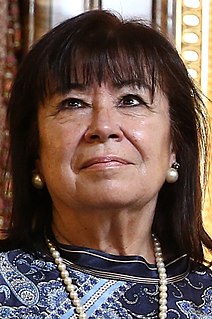
María Cristina Narbona Ruiz is a Spanish politician who currently serves as First Vice President of the Senate. She also presides over the Spanish Socialist Workers' Party (PSOE).

Alfredo Pérez Rubalcaba was a Spanish statesman, politician and chemist who served as Deputy Prime Minister of Spain from 2010 to 2011, and previously as Minister of Education from 1992 to 1993, as Minister of the Presidency from 1993 to 1996, as Minister of the Interior from 2006 to 2011 and as acting Minister of Defence between May and June 2008.
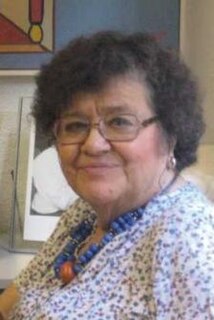
María Cristina Almeida Castro is a Spanish lawyer and politician.

Inés Alberdi was the Executive Director of UNIFEM and has been a noted academic, policy advisor and policy maker on family and women’s issues. Eisenhower Fellowships selected Inés Alberdi in 1998 to represent Spain.

The 35th Federal Congress of the Spanish Socialist Workers' Party was held in Madrid from 21 to 23 July 2000 to renovate the governing bodies of the Spanish Socialist Workers' Party (PSOE) and establish the party's main lines of action and strategy for the next leadership term. It was held after the party's defeat in the 2000 general election and the subsequent resignation of then secretary-general Joaquín Almunia.

Landelino Lavilla was a Spanish lawyer and politician who served as the minister of justice from 1976 to 1979. He also served as member of parliament and as senator. His most important role was as President of the Congress of Deputies during the coup d'état of 23-F in 1981. Jurist Eduardo García de Enterría called him the "principal architect of the transition to democracy".

Matilde Fernández is a Spanish social feminist and politician who served as minister of social affairs of Spain from 1988 to 1993.

Pedro Sánchez Pérez-Castejón is a Spanish politician who has been Prime Minister of Spain since June 2018. He has also been Secretary-General of the Spanish Socialist Workers' Party (PSOE) since June 2017, having previously held that office from 2014 to 2016.
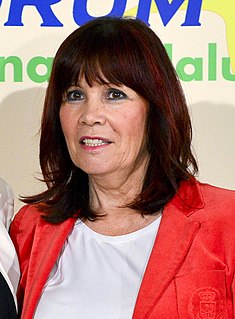
Micaela Navarro is a Spanish politician who was President of the Spanish Socialist Workers' Party since 2014 until 2016. She previously served in both the Senate and the Congress of Deputies of Spain representing Jaén. She also was Counselor of Equality and Welfare of the Junta of Andalucía from 2004 to 2012.

Soledad Cazorla Prieto was a jurist and the first Spanish prosecutor against gender violence. She directed a network of fiscal specialists who worked in this field in Spain after the creation of the 2004 Integral Law against Gender Violence. She held the position for a decade, from 2005 until her death. Remembered as a defender of equality, her professional career was closely linked to the development of this law.

Amparo Rubiales Torrejón is a Spanish politician who belongs to the political party PSOE and is ex-counsellor of the Junta de Andalucía. She holds a PhD in Laws, and is a lawyer and Senior Lecturer of Administrative Law at the University of Seville.
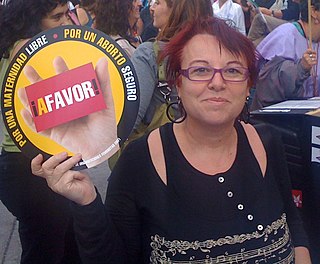
Montserrat Boix Piqué is a Spanish journalist, considered among the most influential women in her country. In early 2000, she created and developed the concepts of social cyberfeminism, and a year later those of feminist hacktivism. Another of her main areas of work is gender violence and communication. She has also stood out as a defender of the right to communication and citizenship rights for women. Since 1986, she has been a journalist for the Information Services of Televisión Española (TVE), in the international section.

Soledad Murillo de la Vega is a Spanish feminist sociologist, researcher, and politician. Since 9 June 2018 she has been the Secretary of State for Equality in the government of Pedro Sánchez. From 2004 to 2008 she was the Secretary General for Equality of Spain's Ministry of Labor and Social Affairs, occupying the top political position in matters of equality in the government of José Luis Rodríguez Zapatero. From 2009 to 2013 she was part of the United Nations' Convention on the Elimination of All Forms of Discrimination Against Women (CEDAW) Committee, and from 2011 to 2015 she was a member of the City Council of Salamanca for the Spanish Socialist Workers' Party (PSOE).
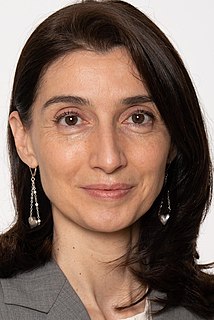
María Pilar Llop Cuenca is a Spanish judge and politician who has been serving as minister of Justice of Spain and ex officio First Notary of the Kingdom since 2021. Previously, she served as the 61st president of the Senate of Spain. She has been Spanish Senator designated by the Assembly of Madrid, an assembly of which she has been part since June 2019. Previously, she was member of the Assembly of Madrid from 2015 to 2018 and Government Delegate for Gender Violence of the Government of Spain from 2018 to 2019.

Laura Nuño Gómez is a Spanish political scientist, researcher, and feminist activist. She is director of the Gender Studies Chair of the Institute of Public Law and the Gender Equality Observatory at King Juan Carlos University (URJC), as well as the creator of the first academic degree in Gender Studies in Spain, and of various postgraduate programs in this subject. She is the author of El mito del varón sustentador, as well as about 30 articles and books about her research. Since the enactment of the Law for Effective Equality of Women and Men, she has been one of the three expert members of the State Council for the Participation of Women.

The 14th Senate of Spain is the current meeting of the Senate of Spain, the upper house of the Spanish Cortes Generales, with the membership determined primarily by the results of the general election held on 10 November 2019. The Senate met for the first time on 3 December 2019. According to the Constitution of Spain the maximum legislative term of the senate is 4 years from the preceding election.

Spain's National March in Opposition to Male Violence(s) Against Women, also known as 7N, was a mass citizen mobilisation, convened as a "feminist movement", which came to occupy the centre of Madrid on 7 November 2015. Organised by three hundred and thirty-two feminist organisations, it had the support of two hundred and twenty-two bodies, including political parties, unions and national and international feminist organisations, as well as one hundred and thirty-five district councils. The final event consisted in the reading of a manifesto compiling the condemnations and demands of the organisations involved, negotiated over nine months through working committees.